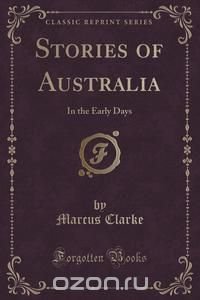Excerpt from Stories of Australia: In the Early Days
Marcus Andrew Hislop Clarke was born at Kensington - the Old Court suburb of London - on the 24th April, 1846. His father, William Hislop Clarke, a barrister-at-law, was recognised as a man of ability, both professionally and as a litterateur, albeit eccentric to a degree. Of his mother little is known beyond that she was a beautiful woman, of whom her husband was so devotedly fond that when her death occurred some months after the birth of the subject of this biography, he isolated himself from the world, living afterwards the life of a recluse, holding of the world an opinion of cynical contempt. Besides his father, there were among other brothers of his two whose names belong to the history of the Australian colonies; the one is that of James Langton Clarke, once a County Court Judge in Victoria, and the other, Andrew Clarke, Governor of Western Australia, who died and was buried at Perth in 1849. The latter was the father of General Sir Andrew Clarke, K.C.M.G., formerly Minister of Public Works in India, and Governor of the Straits Settlements. To the colonists of Victoria he will be better known as Captain Clarke, the first Surveyor-General of the colony, the author of the Existing Municipal Act, and one of the few lucky drawers of a questionable pension from this colony.
The late Marcus Clarke claimed a distinguished genealogy for his family, which, though hailing as regards his immediate ancestors from the Green Isle, were English, having only betaken themselves to Ireland in the Cromwellian period. And among his papers were found the following notes referring to this matter: -
In 1612 William Clarke was made a burgess of Mountjoie, Co. Tyrone, and in 1658 Thurloe wrote to Henry Cromwell, desiring him to give Colonel Clarke land in Ireland for pay.
With an inherited delicate constitution, and without the love-watching care of a mother, or the attention of sisters, he passed his childhood. And that the absence of this supervision and guidance was felt by him in after years, we have but to read this pathetic passage from a sketch of his: -
To most men the golden time comes when the cares of a mother or the attention of sister aid to shield the young and eager soul from the blighting influences of wordly debaucheries. Truly fortunate is he among us who can look back on a youth spent in the innocent enjoyments of the country, or who possesses a mind moulded in its adolescence by the gentle fingers of well-mannered and pious women.
When considered old enough to leave home the boy was sent to the private school of Dr. Dyne in Highgate, another suburb of London, hallowed by having been at one time associated with such illustrious names in literature as Coleridge, Charles Lamb, Keats, and De Quincey. Here he obtained whatever scholastic lore he possessed, and was, according to the opinion of a schoolfellow, known as a humorously eccentric boy, with a most tenacious memory and an insatiable desire to read everything he could lay hands on. Owing to his physical inability to indulge in the usual boyish sports, he was in the habit of wandering about in search of knowledge wherever it was to be gleaned, and not infrequently this restless curiosity, which remained with him to the last, led him into quarters which it had been better for his yet unformed mind he had never entered. Here especially was felt the absence of a mother's guidance, which was unfortunately replaced by the carelessness of an indulgent father. Of his schooldays little is known, save what can be gathered from a note-book kept by him at that period; and even in this the information is but fragmentary. According to this book he seems to have had only two friends with whom he was upon terms of great intimacy.
About the Publisher
Forgotten Books publishes hundreds of thousands of rare and classic books. Find more at www.forgottenbooks.com Это и многое другое вы найдете в книге Stories of Australia (Marcus Clarke)
